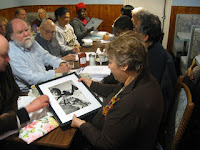 Resolving
the rift between our accepted notions of the Civilized and the Wild is the subject for this year’s summer poetry service at the Unitarian Universalist
Congregation. The theme was suggested by Reverend Frances Sink’s reading of The Practice of the Wild (Counterpoint,
2010), an essay collection from poet Gary Snyder.
Resolving
the rift between our accepted notions of the Civilized and the Wild is the subject for this year’s summer poetry service at the Unitarian Universalist
Congregation. The theme was suggested by Reverend Frances Sink’s reading of The Practice of the Wild (Counterpoint,
2010), an essay collection from poet Gary Snyder.
How we
define these concepts, how they might substantiate a schism that needn’t even
exist and how the prevailing view (especially in regard to Western industrial life) affect our
relations, are just some of the points addressed
this Sunday in a reading featuring participants from the UU community and PoemAlley, including Bonnie
Klotzko, Joseph De Matteo, Dale Shaw, Marianela Medrano, Enzo Malaglisi, John
Sakson, Rowyda Amin, Adriana Rexon, as well as program leader, Ralph Nazareth.
The Receding Orgastic Future
Ralph
finds a topical and unsettling allegory for our fast-devolving times in the
closing musings of Nick Carraway from Fitzgerald’s Jazz Age classic of
opulence, tragic pining and unwarranted privilege, The Great Gatsby, dramatized in this clip from the 2013 Baz Luhrman film:
Instead of rediscovering our original ties with
the biosphere, in the face of global economic collapse, terminal nuclear
contamination, water/oil depletion, solar flare-induced electrical grid
failure, Civilization instead insanely
cries more desperately for fighting Carraway’s inexorable current, not just in
pursuit of flattering, or sanitized post-WWII pasts that never existed, but, as
recent two-dimensional output from Hollywood demonstrates, of ill-conceived “Jetsonian”
futures that could never be, either.
Keeping The Wild at Bay…
Tomorrow-land, a sort of Atlas Shrugged for children from Disney, packaged as an upbeat ode
to the way the future used to be, makes a hollow attempt to condemn our commitment to social procrastination, passivity and distractions. For the 2015 George Clooney
vehicle, itself, proves to be a prime exemplar in defense of the status-quo
assumptions sustaining today's dysfunctional traits—mainly, the magical,
unexamined belief that everything can be remedied with the right application of
technology (by the right people, of course).

This fervent Gatsbyesque yen to believe helps sustain real-world delusions that serve energy and financial interests who benefit mightily by the present Civilization/Wild divide. Contrary to Washington and corporate sponsors proclaiming some nuclear or hydrocarbon Renaissance is just around the corner, able to sustain the US for decades to come (one of the newer financial bubbles-in-the-making, fracking, can only last a few years, according to Peak Oil expert Richard Heinberg), or constitute a “bridge technology” toward a renewable energy future, the only reality such ideas represent is so many boats of infinite growth floundering in the currents of an unyielding, finite planetary system.
Related contemporary definers of the “civilized”
or “progress” informing the titular sleek and high-tech metropolis of TL’s alternate world are a conditioned commitment to convenience, safety and material certainty against everything outside the fragile barriers of our
built-up surroundings, be it predatory animals, senescence, or the demonized
human threat-of-the-month.
 While Tomorrowland toler-ates a given natural habitat and its denizens as no more than decorative accents
to a human imposition on the landscape (save for some birds,
the only evidence of Nature is the prairie surrounding the city), last year’s Interstellar (Paramount/Warner Bros.) espouses an almost strident hostility to the ecosystem
as a whole.
While Tomorrowland toler-ates a given natural habitat and its denizens as no more than decorative accents
to a human imposition on the landscape (save for some birds,
the only evidence of Nature is the prairie surrounding the city), last year’s Interstellar (Paramount/Warner Bros.) espouses an almost strident hostility to the ecosystem
as a whole.
Keeping the Wild Harnessed
Suffering
from a global blight of unspecified origin, much of industrial society has reverted
to an agrarian state to feed a future dying populace, slowly suffocating from a
decline in atmospheric oxygen (somehow connected to the Blight). Cooper,
a bitter ex-astronaut-turned-farmer (played by Matthew McConaughey)
has the opportunity to find a new home for our species in a planetary system
beyond a recently-discovered wormhole, leaving behind his children, but not the
hubris that got humanity into the predicament it faces.
Far from even intimating that any facet of industrial
civilization’s cumulative assaults on the air, water and land might possibly be
responsible, the egotistical rationale for what is happening wavers between the
speculation that in some Gaianistic pique, Earth is pushing humanity out of its
nest for its own good, or rebelling out of hostility (“caretaking” of the Earth
is viewed by Cooper with contempt even as he cluelessly practices the same synthetic pesticide/herbicide-supported monoculture farming that is destroying our agricultural base today).
 Other than humans, not another living thing,
save for trees and crops, appear in the film (Cooper’s farm doesn’t even
have a dog), as if, once more (though to far less glitzy effect) the world is pared down to only what humans can get from it—a sentiment
emphasized when the utilitarianized earthly environment is reproduced with
faithful insipidness within an O'Neill-style orbital habitat that
doesn’t even offer the solace of parklands.
Other than humans, not another living thing,
save for trees and crops, appear in the film (Cooper’s farm doesn’t even
have a dog), as if, once more (though to far less glitzy effect) the world is pared down to only what humans can get from it—a sentiment
emphasized when the utilitarianized earthly environment is reproduced with
faithful insipidness within an O'Neill-style orbital habitat that
doesn’t even offer the solace of parklands. |
| John Adolphus Etzler |
A Dream Not Just Left Behind, But Never There
This is
not to say that the problem with the concept of human civilization rests necessarily
with its capacity to shape the physical world, but with a contemporary dearth
of symbolic thought that used to discipline it. The question is how mindful (and
modest) our awareness of this association can influence our attitudes
about the Civilized and the Wild.
 This
is not an inconceivable prospect. In The Forge and the Crucible (University
of Chicago Press, 1979), Micea Eliade’s overview of alchemical
thought, he observes how early metal-working cultures the world over often
maintained a mindful veneration of blacksmiths for their skill in fabricating
both hand tools and weaponry—corresponding to the creative and destructive capacities in
us all. Agrarian societies in Europe projected their awareness of natural
cycles in reproduction and agriculture to mining activities such that when a
vein was exhausted, it was thought to be simply a matter of closing up the
site, like a fallow field, to give its ores time to replenish themselves—maybe erroneous, but a belief indicative of a patient and cooperative, rather than exploitive,
attitude rarely seen today.
This
is not an inconceivable prospect. In The Forge and the Crucible (University
of Chicago Press, 1979), Micea Eliade’s overview of alchemical
thought, he observes how early metal-working cultures the world over often
maintained a mindful veneration of blacksmiths for their skill in fabricating
both hand tools and weaponry—corresponding to the creative and destructive capacities in
us all. Agrarian societies in Europe projected their awareness of natural
cycles in reproduction and agriculture to mining activities such that when a
vein was exhausted, it was thought to be simply a matter of closing up the
site, like a fallow field, to give its ores time to replenish themselves—maybe erroneous, but a belief indicative of a patient and cooperative, rather than exploitive,
attitude rarely seen today.
Like
Gatsby insisting he can repeat the past, our metaphor-deficient, frantically over-commodified
existence proffers hopeless entrancements at every turn promising we can hit some
cosmic “reset” button to deal with rising sea levels, virulent superstorms or
some other unpredictable disaster, as if such concerns are no more than
transitory inconveniences on the road to something always better… always
greener.
Ultimately,
if Civilization’s adherents are willing to work with and learn from integration
with the Wild, the former could not only become more civil (rendering the latter, less
frightening in the process), but more flexible, too--a crucial attribute, as Civilization’s survival
would depend not on fighting the current, so much as adapting to where it is
taking us.
Where:
Unitarian
Universalist Congregation
20 Forest
Street (directly across from the Avon Theatre)
Stamford,
CT
When:
Sunday,
August 2, 2015
10 am
Contact:
203-322-5438,
Ralph Nazareth





























